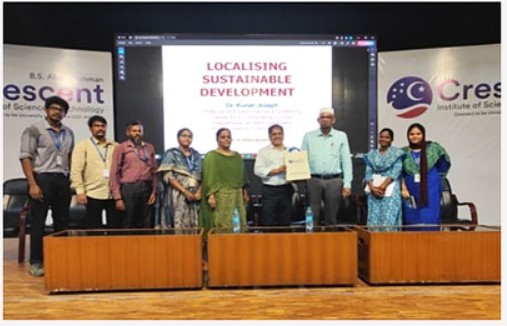Environmental impact
Environmental Sustainability Education
Comprehensive Course Offerings in Environmental Sustainability
B.S. Abdur Rahman Crescent Institute of Science and Technology (BSACIST) demonstrates a strong commitment to climate literacy and environmental sustainability through a diverse range of academic courses across undergraduate (B.Tech) and postgraduate (M.Tech) programs. The Department of Civil Engineering, under the School of Infrastructure, offers a structured curriculum that integrates environmental science, climate change mitigation, and sustainable development. These courses are designed to equip students with the knowledge and skills needed to address pressing global environmental challenges. The availability of these courses serves as a foundational metric in assessing the institution’s dedication to sustainability education. With multiple elective and core courses—such as Environmental Sciences, Water and Wastewater Engineering, Air and Noise Pollution Control, and Sustainable Construction—BSACIST ensures that students have ample opportunities to engage with critical environmental topics.
| S.No | Regulation | B.Tech / M.Tech | Regular / Elective | Course Code | Course Name | Web link |
| 1. | 2021 | B.Tech | Regular | GED 1206 | Environmental Sciences | |
| 2. | Regular | CED 2104 | Water and Waste Water Engineering | |||
| 3. | Elective | CEDX41 | Air and Noise Pollution Control | |||
| 4. | Elective | CEDX42 | Solid Waste Management | |||
| 5. | Elective | CEDX43 | Industrial Waste Water Treatment | |||
| 6. | Elective | CEDX44 | Hazardous Waste Management | |||
| 7. | Elective | CEDX45 | Environmental Risk Assessment | |||
| 8. | Elective | CEDX46 | Environmental Impact Assessment | |||
| 9. | Elective | CEDX47 | Sustainable Water and Sanitation for Smart cities | |||
| 10. | Elective | CEDX53 | Storm Water and Flood Management | |||
| 11. | Elective | GEDX 209 | Disaster Management | |||
| 12. | Elective | GEDX 116 | Green Design and Sustainability | |||
| 13. | Elective | GEDX 229 | Wastewater Management | |||
| 14. | Elective | GEDX 135 | Municipal Solid Waste Management | |||
| 15. | 2017 | B.Tech | Regular | GEC 1212 | Environmental Studies |
|
| 16. | Elective | CECX18 | Environmental Geotechnology | |||
| 17. | Elective | CECX 20 | Industrial health and Safety | |||
| 18. | Elective | CECX 60 | Urban & Indoor Air Quality Management | |||
| 19. | Elective | CECX 63 | Environmental Monitoring | |||
| 20. | 2022 | M.Tech | Elective | CEEY 708 | Green Building and Energy Management |
|
| 21. | Elective | CEEY 181 | Climate change in Water Resources | |||
| 22. | Elective | CEEY 255 | Sustainable Construction | |||
| 23. | Elective | CEEY 258 | Energy Conservation Techniques in Building Construction | |||
| 24. | Elective | CEEY 260 | Construction Demolition and Waste Manag ement |
Credit-Backed Curriculum: Ensuring Academic Rigor
Beyond merely offering courses, BSACIST ensures that these programs lead to officially recognized academic credits, reinforcing their academic rigour and institutional value. Undergraduate students can earn 6 to 18 credits across their eight-semester B. Tech program, while M. Tech students accumulate 3 to 6 credits over four semesters. This structured credit system ensures that environmental education is not just an optional supplement but an integral part of the curriculum. Courses such as Green Building and Energy Management, Climate Change in Water Resources, and Environmental Impact Assessment are academically recognised and aligned with industry and research demands.
Sample Screen shots








Multidisciplinary Approach to Environmental Education
The breadth and depth of environmental courses at BSACIST reflect a multi-disciplinary approach to sustainability. Electives such as Disaster Management, Green Design and Sustainability, and Hazardous Waste Management allow students to specialize in niche areas, fostering expertise in emerging environmental challenges. Additionally, courses like Industrial Wastewater Treatment and Municipal Solid Waste Management emphasize practical solutions, preparing graduates for careers in environmental engineering, policy-making, and sustainable urban development. The inclusion of climate change-focused courses (e.g., CEEY 181 – Climate Change in Water Resources) highlights the institute’s alignment with global sustainability goals (SDGs 6, 11, 13). This diverse course portfolio ensures that students are aware of environmental issues and trained to develop innovative, scalable solutions.
Syllabus reflects a multi-disciplinary approach to Sustainability
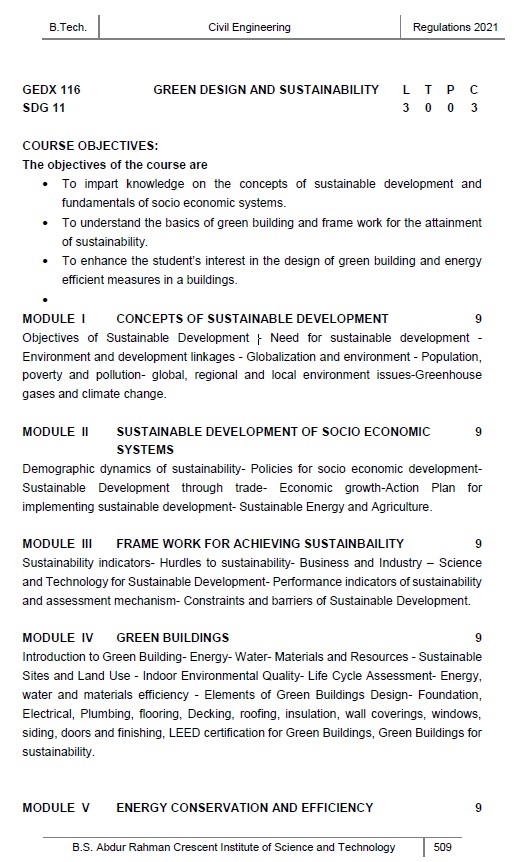
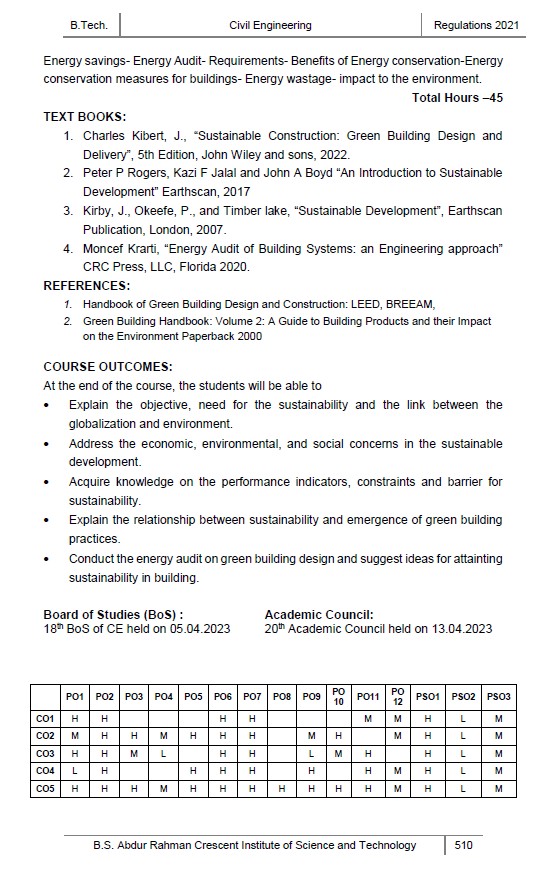
Bridging Theory and Practice: Industry-Relevant Training
BSACIST’s commitment extends beyond theoretical learning, incorporating applied research and industry-relevant training into its environmental programs. Courses such as Environmental Risk Assessment and Sustainable Water and Sanitation for Smart Cities bridge the gap between academia and real-world applications. The institute’s collaboration with research centres and industry partners ensures that course content remains updated with the latest technological and regulatory advancements. Furthermore, the availability of elective courses across multiple semesters allows students to build expertise, culminating in specialized knowledge by graduation progressively. This structured, credit-backed approach ensures that environmental education is measurable, impactful, and career-enhancing, meeting global standards for sustainability in higher education.
Field Visit
The Department of Civil Engineering organized two days field visit to various water and sewage treatment plants located in and around Chennai. These treatment plants are constructed and maintained by Chennai Metropolitan Water Supply and Sewerage Board (CMWSSB). B.Tech – Civil Engineering – II Year students of 2023 – 2027 batch students have visited these treatment plants from 07.10.2024 to 08.10.2024 for the course CED2101 – Mechanics of Structures, CED2102 – Mechanics of Fluids and CED2104 – Water and Wastewater Engineering. Total of 34 students and 3 faculties were visited the Nesappakkam Sewage treatment plant, Kodungaiyur Sewage Treatment Plant, Kilpauk Water Treatment Plant and Puzhal Water Treatment plant to educate students about the various methods used to treat different types of contaminated water, enabling them to obtain clean water for both domestic and agricultural purposes. They also explore topics such as water supply systems, pipeline distribution, and sources of lake water. Additionally, students learn about structural integrity, tank dimensions, materials, special concrete applications, as well as the durability and load-bearing characteristics of these constructions.
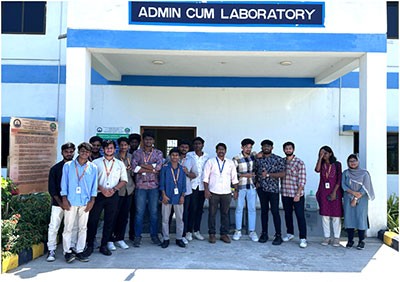
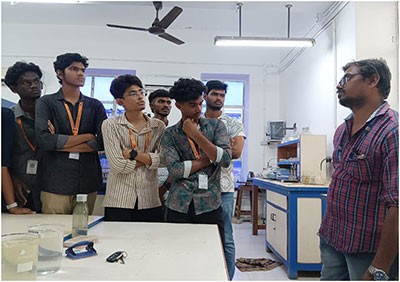
Industrial Visit
The Department of Civil Engineering organized three days industrial visit to various treatment plants like Water treatment plants, Sewage treatment plants and desalination plants for the B.Tech – II Year students (2022 – 2026) from 06.11.2023 to 08.11.2023 in and around Chennai for the course CED 2102 – Mechanics of Fluids, CED 2103 – Concrete Technology and CED 2104 – Water and Wastewater Engineering. Total of 40 students and 4 faculties visited the Nesappakkam Sewage treatment plant, Koyembedu Sewage Treatment Plant, Kilpauk Water Treatment Plant, Puzhal Water Treatment plant and Nemmeli Desalination Plant to gain knowledge about the various treatments provided to treat different kinds of impure water and attain the treated water for the domestic and irrigation use. The students also gain the knowledge on water supply, pipeline water distribution and lake water sources. The students also studied the structural stability, tank size, materials and special concrete used for the construction.
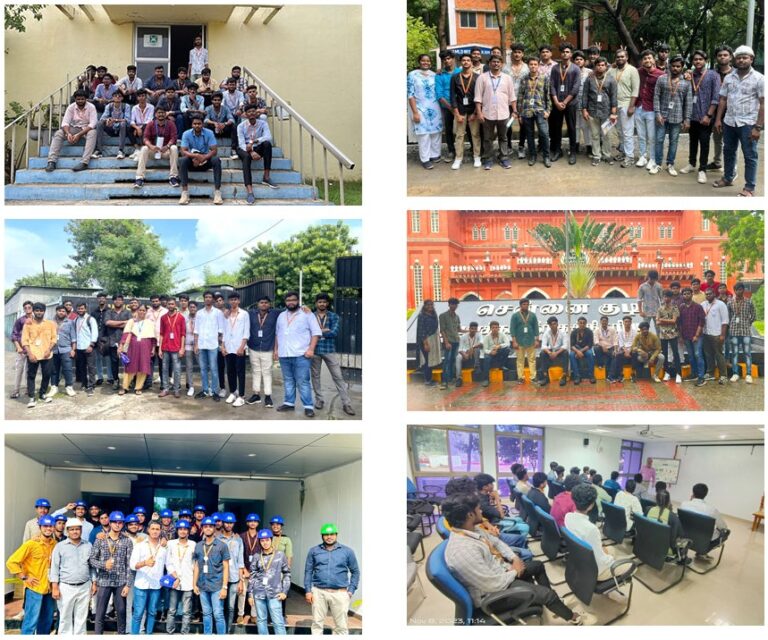
Leadership in Climate Literacy and Future Directions
BSACIST’s robust offering of environmental and climate science courses and a formal credit system underscores its leadership in climate literacy and sustainable education. By providing diverse, credit-bearing courses spanning core and elective categories, the institute ensures that students graduate with theoretical knowledge and practical skills to tackle environmental challenges. This aligns with global benchmarks for sustainability education, as reflected in the scoring metrics. As climate change and environmental degradation remain critical global issues, BSACIST’s academic framework positions it as a forward-thinking institution committed to fostering the next generation of sustainability leaders. Moving forward, continued expansion of specialized courses, research initiatives, and industry partnerships will further solidify its role in advancing environmental education and sustainable development.
Guest Lecture on Green Design and Sustainability
A guest lecture on “Green Design and Sustainability” was organized by Department of Civil Engineering, School of Infrastructure on 19.08.2024 at Convention centre, B.S. Abdur Rahman Crescent Institute of Science and Technology for the benefit of final Year B.Tech students of School of Mechanical Sciences, School of Computer Information and Mathematical Sciences, School of Life Science, and School of Electrical and Communication Sciences. Dr. Kurian Joseph, Professor, Department of Environmental Engineering and the Director, the Centre for Climate Change and Disaster Management, College of Engineering, Guindy campus, Anna University, Chennai, delivered a keynote address. ( Report )
